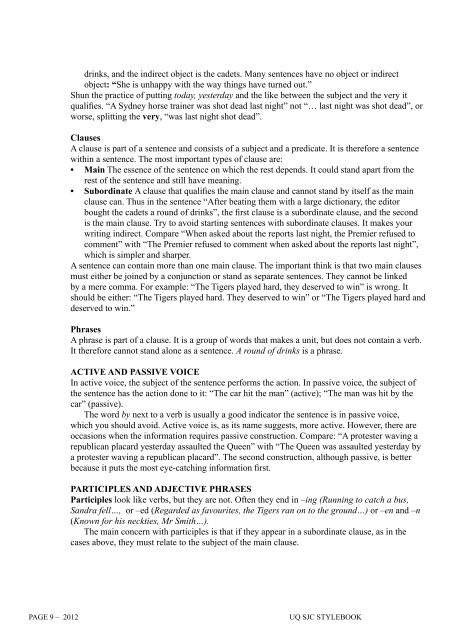You also want an ePaper? Increase the reach of your titles
YUMPU automatically turns print PDFs into web optimized ePapers that Google loves.
drinks, <strong>and</strong> the indirect object is the cadets. Many sentences have no object or indirectobject: “She is unhappy with the way things have turned out.”Shun the practice of putting today, yesterday <strong>and</strong> the like between the subject <strong>and</strong> the very itqualifies. “A Sydney horse trainer was shot dead last night” not “… last night was shot dead”, orworse, splitting the very, “was last night shot dead”.ClausesA clause is part of a sentence <strong>and</strong> consists of a subject <strong>and</strong> a predicate. It is therefore a sentencewithin a sentence. The most important types of clause are:• Main The essence of the sentence on which the rest depends. It could st<strong>and</strong> apart from therest of the sentence <strong>and</strong> still have meaning.• Subordinate A clause that qualifies the main clause <strong>and</strong> cannot st<strong>and</strong> by itself as the mainclause can. Thus in the sentence “After beating them with a large dictionary, the editorbought the cadets a round of drinks”, the first clause is a subordinate clause, <strong>and</strong> the secondis the main clause. Try to avoid starting sentences with subordinate clauses. It makes yourwriting indirect. Compare “When asked about the reports last night, the Premier refused tocomment” with “The Premier refused to comment when asked about the reports last night”,which is simpler <strong>and</strong> sharper.A sentence can contain more than one main clause. The important think is that two main clausesmust either be joined by a conjunction or st<strong>and</strong> as separate sentences. They cannot be linkedby a mere comma. For example: “The Tigers played hard, they deserved to win” is wrong. Itshould be either: “The Tigers played hard. They deserved to win” or “The Tigers played hard <strong>and</strong>deserved to win.”PhrasesA phrase is part of a clause. It is a group of words that makes a unit, but does not contain a verb.It therefore cannot st<strong>and</strong> alone as a sentence. A round of drinks is a phrase.ACTIVE AND PASSIVE VOICEIn active voice, the subject of the sentence performs the action. In passive voice, the subject ofthe sentence has the action done to it: “The car hit the man” (active); “The man was hit by thecar” (passive).The word by next to a verb is usually a good indicator the sentence is in passive voice,which you should avoid. Active voice is, as its name suggests, more active. However, there areoccasions when the information requires passive construction. Compare: “A protester waving arepublican placard yesterday assaulted the Queen” with “The Queen was assaulted yesterday bya protester waving a republican placard”. The second construction, although passive, is betterbecause it puts the most eye-catching information first.PARTICIPLES AND ADJECTIVE PHRASESParticiples look like verbs, but they are not. Often they end in –ing (Running to catch a bus,S<strong>and</strong>ra fell…, or –ed (Regarded as favourites, the Tigers ran on to the ground…) or –en <strong>and</strong> –n(Known for his neckties, Mr Smith…).The main concern with participles is that if they appear in a subordinate clause, as in thecases above, they must relate to the subject of the main clause.PAGE 9 – <strong>2012</strong>UQ <strong>SJC</strong> STYLEBOOK


